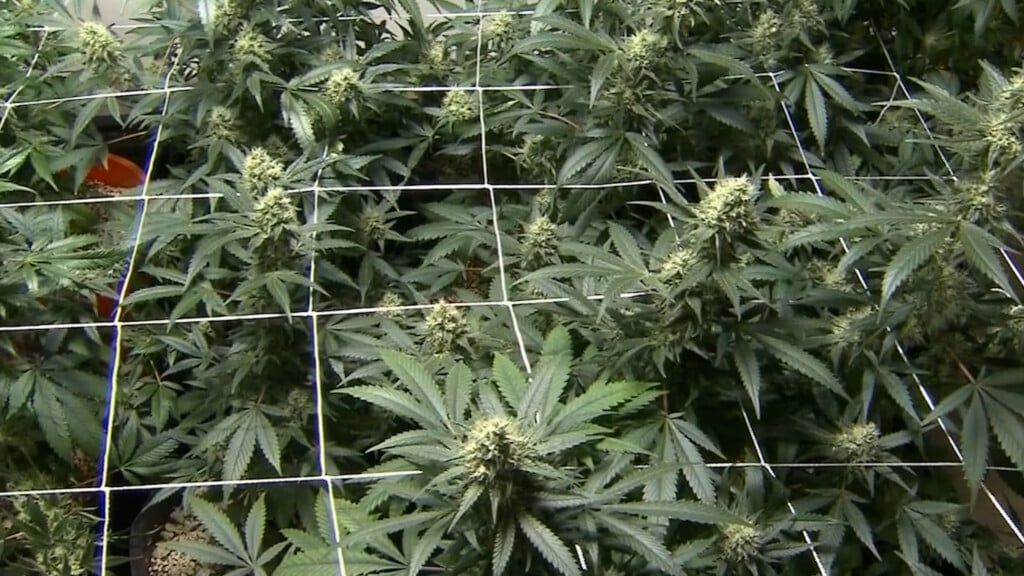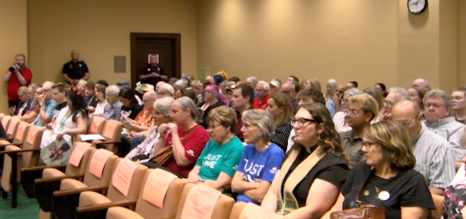Committee advances property tax relief plan in Nebraska Legislature
LINCOLN (Nebraska Examiner) — The Nebraska Legislature’s Revenue Committee voted out a property tax relief plan Monday that combines various proposals offered in the special legislative session.
The combined package, which advanced 6-1, is contained in Legislative Bill 34.
The plan would lower maximum property tax rates for the state’s 244 school districts; shift funding for the 23 natural resources districts to the state; cap annual increases in county and municipal property tax collections; and reimburse counties for jail operating expenses.
Funding would be provided by removing about 70 sales tax exemptions, raising “sin” taxes and imposing a 50-cent fee on retail delivery services that include a taxable item. One new sales tax exemption would be added on residential electricity.
State Sen. George Dungan of Lincoln was the lone no vote. Sen. Eliot Bostar of Lincoln voted present.
SEE ALSO: A Zyn tax: Nebraska lawmakers consider levy on alternative nicotine products
Sen. Lou Ann Linehan of Elkhorn introduced the core proposal this session from Gov. Jim Pillen in LB 1, but all eyes will be on LB 34, bipartisan legislation from State Sen. Tom Brewer of north-central Nebraska. As introduced, it was a “backup plan” to freeze valuations for four years.
Lawmakers will consider capping maximum general fund school tax rates, which cover operational expenses, at 40 cents per $100 of a property’s valuation beginning next year, down from $1.05. That rate would drop an additional 5 cents a year before landing at 30 cents.
Tax rates are still being determined for the 2024-25 school year; homeowners would see varying relief based on their district tax rate.
School boards would retain authority over special building funds (at 10 cents per $100, instead of the current ceiling of 14 cents), special abatement and maintenance projects and bonds.
Voters could be asked to increase a school district’s maximum tax rate, too.
If LB 34 passed, Nebraskans would see a tax “credit” on their 2025 tax statements.
SEE ALSO: Pillen changes part of tax plan that worried Nebraska law enforcement
The amended LB 34 would also address the state’s equalization aid formula for schools, using it as the main vehicle to funnel the new state aid to schools.
One component of that formula, the “local effort rate,” which assumes a hypothetical $1 tax rate, would be set at 2.5 cents below the maximum levy. Currently, it is 5 cents below the max levy.
Another provision in LB 34 would ensure that school districts receive, at a minimum, the same state funding year over year.
SEE ALSO: ‘I just can’t do it anymore’: Property tax increase is latest blow to struggling Lincoln mom
Since discarding LB 1, lawmakers have removed some of the largest possible sources of sales tax revenue, such as on accounting services, legal services, motor vehicle repair and home maintenance or improvement.
On Monday, lawmakers also abandoned the hotly contested idea of taxing agricultural or manufacturing machinery and equipment.
Still on the list of goods and services to be newly taxed are hair care services, data centers, single-day admissions to zoos and aquariums, dating services, lobbying services and pet-related veterinary services or animal grooming.
Each of the new goods or services would be taxed at 5.5 cents per dollar, in addition to being subject to local sales taxes, which range from 0.5 to 2 cents.
SEE ALSO: ‘Don’t kill our industry’: Lincoln distillery pushes back on proposed 287% tax hike
The state intends to retain the local sales taxes on the newly taxed goods and services for property tax relief.
Currently, the state captures 3% of local sales taxes as an administrative fee that is put into a fund for aid to municipalities.
The bill would increase that state capture to 15%, with the increase collected specifically for property tax relief.
SEE ALSO: 20 bills introduced as Nebraska senators start special session
Cities or villages would receive at least the amount of local sales tax revenue that was returned to them in 2023-24, plus 1% more in each successive year.
Local governments raised a total of $655 million in sales taxes that year, so an annual 1% increase would be $6.55 million.
Bostar said he would work on language to ensure the state collects the local sales taxes on new items only, not on the whole tax base.
SEE ALSO: Nebraska Gov. Jim Pillen officially calls special session on property taxes
Sen. Carol Blood of Bellevue originally proposed a 27-cent retail delivery service fee in LB 26, which the committee included, but at a higher, 50-cent rate per delivery.
That applies to deliveries for taxable items, so shipments with only groceries or medicine would not include the service fee.
New businesses within their first year or businesses with less than $500,000 in annual retail sales would be exempt from the fee.
A new tax that was in LB 1 that isn’t part of LB 34 is on cloud or data storage or on advertising services. Opponents had argued in part that the ad tax would get caught up in litigation.
SEE ALSO: ‘No plan and no real direction’: Nebraskans slam Pillen’s property tax plan at forum
The following “sin” goods would also see bumps in their tax rates, though smaller than proposed in the Pillen-backed LB 1:
- Soft drinks and candy — 5.5 cents, plus local sales taxes up to 2 cents (currently sales tax exempt).
- Consumable hemp — 30% wholesale (currently sales tax exempt).
- Cigarettes — $1.36 per pack of 20, same as Iowa (up from 64 cents; Pillen proposed $1.64).
- “Alternative nicotine products,” including oral nicotine pouches like Zyn — 10 cents per ounce (this was newly added after being the subject of a last-minute hearing last week).
- E-cigarettes — 30 cent per milliliter excise tax on disposable vape liquids (currently 5 cents per milliliter) and 30% wholesale on other electronic nicotine products (up from 10% wholesale tax).
- Keno — 5% of gross proceeds (up from 2%).
- Spirits (not including beer or wine) — a two-tiered tax of $2.75 per gallon for companies that produce fewer than 100,000 gallons per year and $7 if they produce more than 100,000 gallons (currently $3.75 per gallon; Pillen proposed $14.50 per gallon).
- Games of skill — 20% of net operating revenue for each cash device (up from 5%).
LB 44, from Bostar, which was also included in the package, would double the amount of earned income tax credits from 10% of the federal credit to 20%.
LB 39, from State Sen. Kathleen Kauth of Omaha, was also included. It would restore homestead exemption eligibility to some homesteads that qualified in the past three years but, because of rising valuations, were kicked off.
Any year-to-year increase in general tax receipts for the state above 3% would be captured for property tax relief.
Municipal and county governments’ annual increases in property tax collections would be capped at the inflation rate or 0% in times of deflation.
Inflation would be measured by a more specific index for state and local government expenses, rather than general consumer purchases in the consumer price index.
Public safety services broadly, ranging from law enforcement, fire departments and jails to county attorneys and public defenders, would be exempt from those caps.
LB 28, from Bostar, was also included. It would remove public safety services from existing budget restrictions.
The plan would reimburse counties for 25% of operational and maintenance costs for county jails next year and 50% in future years.
The committee also advanced the bill with language to protect tax-increment financing, an economic development tool used in blighted areas.
It allows a developer, with local government approval, to use property taxes for such a project.
Sen. Brad von Gillern of Elkhorn, the Revenue Committee vice chair, said existing projects would not be negatively impacted.
Other exemptions for local governments include emergencies and growth.
Local governments could carry forward unused property tax authority in future years, but no more than 5% from the prior year.
More taxes could also be collected if approved by a majority of voters in a regularly scheduled election.
The committee also advanced a change to the state’s occupation tax, for restaurants and hotels, which currently caps populous communities like La Vista to $750,000 in revenue annually.
Lawmakers also embraced LB 67 from State Sen. Justin Wayne of Omaha to have the state take over funding for the state’s 23 natural resources districts, which is about $95 million, through tax credits.
In 2025, the credit would be equal to 50% of property taxes, then 75% in 2026 and 100% in 2027 and beyond.
The first of three rounds of debate on LB 34 is expected to begin Tuesday.
First-round debate can last up to eight hours, at which point it would need support from at least 33 lawmakers to proceed.



